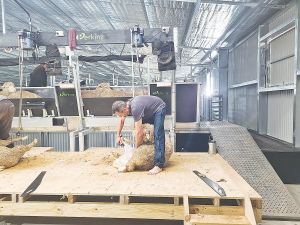While most established sheep properties are likely to have a large traditional woolshed, many of these will be a little long in the tooth and craving some attention to maintenance.
This is not surprising when they are only used for a few weeks every year. Given the current economic climate for strong wool, it is also unlikely that many will receive any TLC in the foreseeable future.
While alternatives are a little thin on the ground, a South Island company has approached the logistics of the shearing shed from a different angle – with the PerkinZ ShearMaster System. In traditional woolsheds, the majority of the internal floorspace is taken up by holding pens that in turn feed the catching pen behind the shearing stands.
The ShearMaster System takes the form of a race that runs parallel to the shearing stands. The layout is said to significantly reduce the distance a shearer needs to move to grab an animal for shearing, typically only needing to move around a metre.
By contrast, using a traditional catching pen, the shearer needs to leave the stand, walk into the pen, grab an animal and return to his handpiece – typically a distance of three to four metres. Wayne Perkins explains that with a typical shearer dealing with around 250 animals of up to 80kg each day, the improved presentation and reduced “capture” distances can typically add up to an extra 20 shorn sheep to daily tallies.
With 15 years of shearing experience, including five seasons in the United Kingdom, Perkins found that race-type systems that eliminated the “catch and drag” approach offered many benefits – including set-up and speed of operation.
“If a shearer is dealing with around 250, 80kg sheep and dragging them three to four metres, that means he is handling 20 tonnes of sheep meat and moving them between 800 and 1000 metres,” he explains. “Moving them using the ShearMaster System means moving that same 20 tonnes only around 120 metres.”
Perkins adds that there are also significant benefits for both the shearer and the animals: fewer stresses and strains, and a longer working life for the shearer.
Available in systems ranging from one to six stands, the company is already experiencing high levels of interest from Australia, where six installations have already been completed.
Perkins points out that the system requires significantly less shed space and capital expenditure compared to a new, sole purpose wool shed.
The system can be installed in a multipurpose shed that when not being used for shearing duties can be used for storage of produce or even farm machinery.
“There aren’t many professions where a worker takes a sweat towel to work and uses it all day,” Perkins adds.
“We set out to make a tough job easier and at the same time raise daily outputs by incorporating clever ideas, such as an opening race side that lets gravity drop the sheep onto the boards.”
He also points out that there is no technology to go wrong and no premium to pay.
“Our system is designed by a shearer, not by an engineer. The overriding consideration is both the shearers’ and the animals’ welfare, an area coming under greater scrutiny and oversight by regulatory authorities.”
www.perkinz.co.nz



















